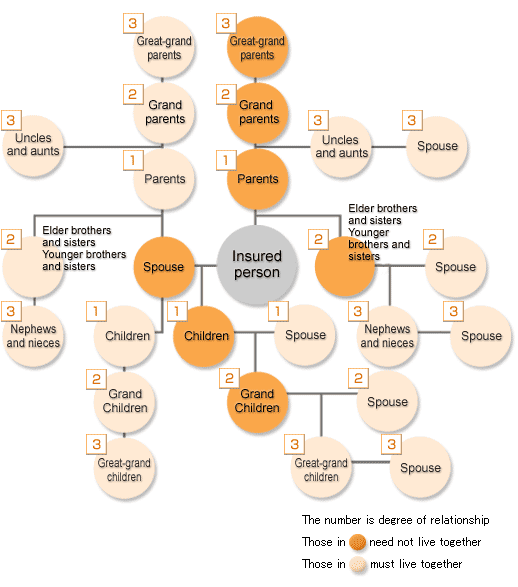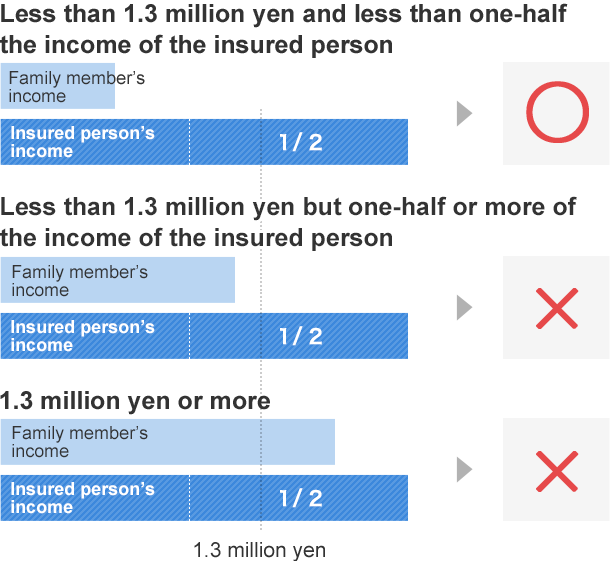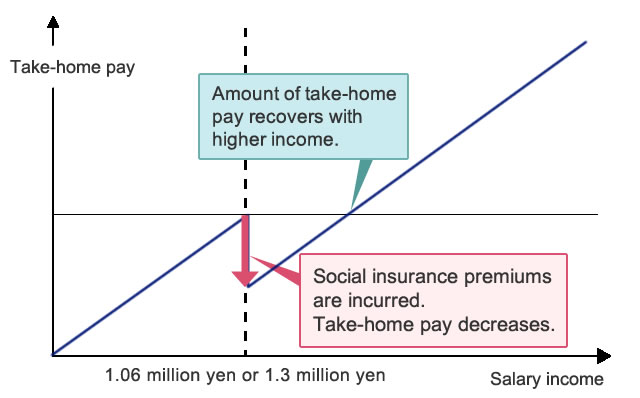Family membership
Health insurance provides insurance benefits not just to insured persons but also to their dependent family members. These family members are referred to as “dependents”.
A dependent is defined by law as “a person who is financially supported mainly by the insured person,” and the criteria differ from tax law dependency.
Therefore, a dependent is a relative who cannot live without economic support from the insured person, and the Health Insurance Society makes certification decisions based on standards established by law.
To be certified as a dependent, one must reside in Japan and meet certain conditions regarding family relationship and income.
- Tips
-
- Dependents must be certified by the Health Insurance Society.
- If there is any change in your dependents, submit notification of the change within five days.
Extent of family relationship
The scope of family members eligible to be certified as dependents is legally defined. Conditions for dependent eligibility also vary depending on whether or not the family member lives with the insured person.
Family members who may live with or apart from the insured person:
- Spouse (including common law spouse)
- Children, grandchildren
- Siblings
- Parents and other lineal ascendants
Family members who must live with the insured person:
- Family members within the third degree of consanguinity other than those above
- Parents and children of the insured person's common law spouse
- Parents and children of deceased common law spouse

Please verify eligibility as a dependent in advance.
Self-check chart 1: Spouse
Self-check chart 2①: Child (under 16 years old)
Self-check chart 2②: Child (16 years old and above)
Self-check chart 3: Parents
Self-check chart 4: Siblings
Self-check chart 5: Others (within third degree of kinship with cohabitation requirement)
Dependent Relationship
Dependents must be individuals primarily supported by the insured person's income.
- The dependent relationship requires that the insured person provide financial support to the dependent.
- We verify not only the dependent's income, but also the insured person's income.
- It is necessary that the insured person financially support more than half of the living expenses required for the dependent's livelihood.
- If the dependent receives financial support from relatives other than the insured person or receives survivor's pension, disability pension, etc., verification is needed to confirm that the insured person is the primary source of livelihood support.
Individuals of Working Age
Those aged 16 or older (after completing compulsory education) to under 60 are normally considered to be of working age and deemed capable of living independently without financial support from the insured person.
Therefore, to become a dependent, it is necessary to submit documentation proving inability to work and to declare that normal living conditions cannot be maintained without financial assistance from the insured person.
The Health Insurance Society will verify these facts.
Consideration of Support Obligations Among Relatives
When the dependent application is for a spouse or economically dependent children (primarily those in compulsory education, etc.), a comprehensive judgment will be made based on individual circumstances, taking into consideration not only the financial support from the insured person, but also socially accepted support obligations among relatives (obligation to maintain livelihood, obligation to provide living assistance, etc.).
In such cases, we will verify the actual livelihood situation between spouses from the past and the status of financial support for economically dependent children (primarily those in compulsory education, etc.).
Child Dependency for Dual-Income Couples
When determining child dependency status for couples who both work, we will, in principle, estimate income for the coming year based on past, current, and future income, and recognize the child as a dependent of the spouse with higher income. If the spouse's annual income is higher than that of the insured person, the child will be the spouse's dependent.
Therefore, even for those already recognized as dependents by this Health Insurance Society, if the spouse's annual income becomes higher than the insured person's, procedures to remove the child from dependency status will be necessary from then on.
In such cases, to avoid gaps in the child's health insurance coverage, the child should be removed from this Health Insurance Society (by submitting removal procedures) on the same day they are approved by the new Health Insurance Society*.
Conversely, if there is a reversal in annual income and a child's dependency needs to be transferred from the spouse's Health Insurance Society to the insured person belonging to this Health Insurance Society, the child should be removed from their current Health Insurance Society (the spouse must apply for removal procedures at that Health Insurance Society separately) on the same day they are approved by this Health Insurance Society*. The approval date by this Health Insurance Society will be the day the application is received and approved.
* Instructions in an administrative notice by the Employees’ Health Insurance Division, Health Insurance Bureau, Ministry of Health, Labour and Welfare
Income standards
To become a dependent, it is necessary to “live primarily off the income of the insured person.”
Additionally, the income of certification candidates refers to all funds that can be used for living expenses.
Regarding the determination of annual income, an age requirement of 19-22 years old has been added, effective October 1, 2025.
- Items calculated on a monthly basis (certification not possible if 108,334 yen or more)
- Salary
- Income from side jobs, part-time work, temporary work, etc.
- Items calculated on an annual basis (certification not possible if 1.30 million yen or more; 1.80 million yen or more for those aged 60 or older or with disabilities)
- Employees' Pension, National Pension, Survivor's Pension, Public Officers Pension, private pension, etc.
- Business income (commercial, agricultural, forestry, livestock, fishing, etc.)
- Rental income
- Other
- Dividend/interest income and other income such as manuscript fees
- Non-taxable monetary benefits (benefits from social insurance or social security, etc.)
Example: Injury and Sickness Allowance, Maternity Allowance, Childcare Leave Benefits, Unemployment Benefits from Employment Insurance, etc.
- * If you are receiving unemployment benefits from Employment Insurance or Maternity Allowance/Injury and Sickness Allowance, we accept dependent applications only if the daily converted amount is less than 3,612 yen for those under 60 years of age, or less than 5,000 yen for those aged 60 or older.
The “annual” in annual income does not necessarily refer to one year from January 1 to December 31, but rather to the income expected over a one-year (12-month) period from the time of the occurrence of the qualifying event.
| If the family member lives with the insured person | If the family member lives apart from the insured person |
|---|---|
| The family member's annual income must be less than 1.3 million yen (1.5 million yen if aged 19-22* [and not the insured person's spouse]; 1.8 million yen if aged 60 or above or with a disability eligible for receipt of Disability Employees' Pension benefits) and must be less than one-half the income of the insured person. | The family member's annual income must be less than 1.3 million yen (1.5 million yen if aged 19-22* [and not the insured person's spouse]; 1.8 million yen if aged 60 or above or with a disability eligible for receipt of Disability Employees' Pension benefits) and must be less than the amount of the allowance sent to the family member from the insured person. |
- * In the same way as age is defined under the Income Tax Act, whether a family member is aged 19-22 is determined based on the family member's age as of December 31 of the year. (Note that under the Civil Code, one year is added to your age on the day before your birthday, so for a family member whose birthday is January 1, the family member's age will be increased on December 31.)

Remittances
When applying for a relative living separately as a dependent, the conditions for being considered “maintained financially by the insured person” must be met. Even for already approved dependents who change from living together to living separately, you must, in principle, prove that their livelihood continues to be maintained through remittances from the insured person after the separation (excluding separation due to job transfer). The insured person must make monthly remittances to the account of the person to be certified. Please apply with documents proving at least three months of remittances after the separation.
During dependent verification, we will confirm remittances by requesting submission of either bank transfer receipts, copies of bankbook pages, or receipts of registered mail for cash (including copies). For information regarding the remittance amount, please contact the Health Insurance Society.
Government measures to address annual income barriers (starting in October 2023)
- Reference link
What are annual income barriers?
Annual income barriers refer to threshold income amounts that determine whether or not taxes and social insurance premiums are incurred.
Individuals who have dependent status and work part-time or other non-regular jobs will lose their dependent status if their annual income exceeds a certain figure, and become an insured person under a company health insurance plan, National Health Insurance, or other insurance system. They will then be required to pay social insurance premiums, which may result in lower take-home pay.
One of two different annual income barriers applies for social insurance premiums, depending on company size and other factors: 1.06 million yen or 1.3 million yen.

(Source: Provisional measures to address annual income barriers (Ministry of Health, Labour and Welfare))
| 1.06 million yen annual income barrier | At companies with 51 or more employees, an employee will incur social insurance premiums if certain conditions, such as when monthly wages are 88,000 yen or more (i.e., annual income is approximately 1.06 million yen or more), are satisfied. |
|---|---|
| 1.3 million yen* annual income barrier | Social insurance premiums are incurred automatically without exception, since the worker no longer meets the dependent eligibility criteria. |
- * 1.5 million yen if aged 19-22 [and not the insured person's spouse]; 1.8 million yen if aged 60 or above or with a disability eligible for receipt of Disability Employees' Pension benefits
Handling for the 1.3 million yen annual income barrier
Although dependent certification is based on checking of taxation certificates and other documents from the previous year, if the worker’s annual income is expected to temporarily exceed 1.3 million yen due to longer hours because of labor shortage or other factors, the worker may choose to retain his or her dependent status simply by attaching a certificate from the employer.
(In principle, this handling is available no more than two consecutive times for a single worker.)
Handling for the 1.06 million yen annual income barrier
Companies that help increase worker income through means such as payment of allowances to encourage social insurance coverage* will be provided subsidies for a finite term.
* Allowances to encourage social insurance coverage
These allowances are intended to encourage employee insurance coverage for those working reduced hours and to reduce the burden of insurance premiums when workers who had been ineligible for insurance are newly covered by insurance.
Allowances to encourage social insurance coverage are to be paid apart from salaries and bonuses. They are not considered when calculating the standard monthly remuneration or standard bonuses used to determine insurance premiums.
- * Eligible persons: Those with standard monthly remuneration of 104,000 yen or less
- * Maximum allowance amount excluded from standard remuneration: Amount equivalent to the insurance premiums newly incurred by the employee due to insurance coverage
- * A time-limited measure not to exceed two years
New requirement concerning residency in Japan for dependent certification
From April 2020, a requirement related to residency in Japan is added to the requirements for certification of health insurance dependents. In principle, from April 1, 2020, those who do not have addresses in Japan cannot be certified as dependents (with certain exceptions?for example, students studying abroad).
Rationale underlying the domestic residency requirement
Determinations of residency are based on whether a person is registered to the basic resident register (i.e., whether or not the person has a certificate of residence). In principle, those who have certificates of residence in Japan meet the domestic residency requirement.
- Note: Even those who have certificates of residence in Japan will not satisfy the domestic residency requirement if they clearly do not reside in Japan?for example, those employed overseas.
Exceptions to the domestic residency requirement
Those whose livelihoods are recognized to be based in Japan, such as students studying abroad temporarily, are considered to meet the domestic residency requirement on an exceptional basis, even if they actually reside overseas.
[Cases qualifying as exceptions to the domestic residency requirement]
- (1) Students studying abroad
- (2) Family members accompanying an insured person posted abroad
- (3) Those traveling abroad temporarily for sightseeing, recreation, volunteer activities, or other reasons unrelated to employment
- (4) Those who enter into a family relationship to an insured person while the insured person is posted abroad
- (5) In addition to those described under (1)-(4) above, others whose livelihoods are recognized to be based in Japan in consideration of purposes of traveling abroad and other circumstances
Cases in which a person cannot be certified as a dependent even if he or she resides in Japan
Those who come to Japan on medical visas or on long-stay visas for sightseeing or recreational purposes cannot be certified as dependents, even if they reside in Japan.
Interim measure
As an interim measure, if a person who would lose his or her eligibility as a dependent due to the addition of the domestic residency requirement is hospitalized in a medical care institution in Japan as of the date of enactment of the requirement (April 1, 2020), his or her eligibility will continue during the period of hospitalization.
Dependent Certification Date
Although regulations stipulate that notification must be made within five days of the dependent application date (Regulation for Enforcement of the Health Insurance Act, Article 38), if notification cannot be made within five days due to unavoidable reasons, this Health Insurance Society will verify the complete application documents within one month and, only if dependent requirements are met, will approve dependency retroactively from the date of the qualifying event.
If documents are not received within one month, the dependent certification date will be the date this Health Insurance Society receives the documents.
For the certification date of children in dual-income households, please refer to “Child Dependency for Dual-Income Couples.”
Review of Dependent Eligibility
After certification, dependent eligibility will be periodically verified, or verified on an as-needed basis, by requesting necessary documentation from the insured person. This is called validation.
* Please keep certification documents for at least two years.
If validation results determine that dependent eligibility no longer exists, the insured person will be notified, and the dependent's eligibility will be removed retroactive to the date it was determined to have been lost.
If eligibility is removed, you must return the full amount of medical expenses and other benefits incurred during the relevant period. In accordance with national laws and circular notices, validation is conducted regularly once a year, and we ask for the cooperation of all applicable insured individuals.
Dependent certification in cases of joint spousal support (when both spouses work)
In cases of joint spousal support (when both spouses work), the following criteria apply for determining which spouse's dependents the family members will be:
- Regardless of the number of dependent family members, they will be certified as dependents of the insured person with the higher annual income (hereinafter, "annual income" refers to projected income over the coming one-year period, based on past, current, and future earnings).
- If the difference in annual income between both spouses is no more than 10%, then the family members will be certified as dependents of the one of which the Society has been notified as the primary provider.
- If one of the spouses is an insured person under National Health Insurance, then the family members will be certified as dependents of the one with the higher income when comparing the annual income of the insured person under the Health Insurance Society and the projected annual income based on the most recent annual earnings of the insured person under National Health Insurance.
- If one spouse's health insurer does not certify the family members as dependents, a notice of such decision will be issued by the health insurer. The insured spouse of the other health insurer must then attach this notice when applying for dependent certification to the other health insurer.
- When removing the family members as dependents due to a reversal in annual income between the spouses, the deletion must be done only after first confirming that the health insurer of the insured spouse with the higher annual income will certify the family members as dependents.
- If the primary provider takes childcare leave or other leave, the dependent family members will remain dependents during the leave period, as a special measure to ensure the stability of dependent status. (Procedures for dependent certification must be conducted anew for a newborn child.)
If there has been a change in dependents
You must take specific steps if the number of dependents increases due to marriage or childbirth or a family member is no longer eligible as a dependent for reasons such as employment, living apart from the insured person, or death. The Health Insurance Society checks the eligibility status of dependents annually.
Additionally, if income of 108,884 yen or more per month is continuously earned for three consecutive months, the removal date will, in principle, be the first day of the following month.







